Business in the Maghreb (Bachelor of Science, Africa)
Optional Subject - Business in the Maghreb (Bachelor of Science in Inter-African Business, e-learning,)
| Bachelor of Science in Inter-African Business |
Optional Subject - “Doing Business in the Maghreb” (8 ECTS) - Online Bachelor of Science in Inter-African Business (Sixth semester).
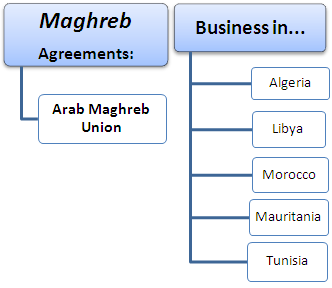

The main objective of The Subject “Foreign Trade and Business in the Maghreb” is to offer a global vision of the Maghrebian economy and the business opportunities in the Maghreb.
- To learn to do business in Morocco, Algeria, Tunisia.
- To understand the importance of the AMU (Arab Maghreb Union)
- To analyze the Foreign Direct Investment and International Trade in the Maghrebian Markets
- To know the main Maghrebian Businessmen
- To develop a Business Plan for the Maghreb
Syllabus of the Program: Arab Maghreb Union (AMU).
- Introduction to the Maghreb
- Introduction to the Arab Maghreb Union (AMU)
- Treaty of Marrakech
- Objectives and mission of the Arab Maghreb Union
- Institutions of the Arab Maghreb Union
- Maghrebian Bank of Investment and International Trade
- Economy of the Maghreb
- Economic Integration in the region of the Arab Maghreb Union
- Competitiveness of the Maghrebian countries
- International Trade of the countries of the Arab Maghreb Union
- Agreements with other Organizations
- Maghrebian ports
Objectives of the Program “Arab Maghreb Union (AMU)”:
- To understand the objectives and institutions of the Arab Maghreb Union (AMU)
- To evaluate the advantages for the member countries and the areas of cooperation of the Arab Maghreb Union
- To analyze the competitiveness of the Maghrebian countries
- To analyze the Economic Integration process (free movement of persons, services, products, Common Market...) and International Trade between the member countries of the Arab Maghreb Union
- To analyze the role of the Bank Maghrebian of Investment and foreign trade
Agadir Agreement. Arab Mediterranean Free Trade Agreement.
- Introduction to the Arab Mediterranean Free Trade Agreement (Agadir Agreement)
- Member countries of the Agadir Agreement: Egypt, Morocco, Tunisia and Jordan
- Role of the EU in the Agadir Agreement
- Technical unit of the Agadir Agreement
- Barcelona Process
- accumulation of Origin with the Euro-Mediterranean countries
- International Trade between the member countries of the Agadir Agreement
- International Trade with the EU
Syllabus of the Program: Doing Business in Algeria
- Introduction to Algeria
- Algerian Economy
- Algerian International Trade
- Port of Algiers and Port of Oran
- Invest in Algeria
- Business opportunities in Algeria
- Access to the Algerian market
- Business Plan for Algeria
Ali Haddad
- The Algerian Muslim Businessman Ali Haddad
- The Construction Group ETRHB Haddad
Issad Rebrab
- The Algerian entrepreneur Issad Rebrab
- CEVITAL Group
Objectives of the Program “Doing Business in Algeria”:
- To know the trade agreements of Algeria
- To analyze the trade relations of Algeria
- To study the company profiles and Algerian Businessmen
Syllabus of the Program: Doing Business in Libya
- Introduction to Libya
- Libyan Economy
- Libyan International Trade
- Business opportunities in Libya
- General Council on Privatization and Investments
- Case Study:
- Libyan oil sector
- Libyan Free-Trade Areas
- Access to the Libyan market
- Business Plan for Libya
Objectives of the Program “Doing Business in Libya”:
- To know the business opportunities in Libya
- To know the trade agreements of Libya
- To investigate trade relations of Libya with the country of the student
Syllabus of the Program: Doing Business in Mauritania
- Introduction to Mauritania
- Business in Nouakchott
- Mauritanian Economy
- Mauritanian International Trade
- Business opportunities in Mauritania
- Fishing
- Agriculture
- Mauritanian mining sector
- Mauritanian companies:
- Mauritel mobiles
- National Industrial and Mining Company
- Invest in Mauritania
- Access to the Mauritanian market
- Business Plan for Mauritania
Objectives of the Program “Doing Business in Mauritania”:
- To learn to do business in Mauritania
- To know the business opportunities in Mauritania
- To explore the free trade agreements of Mauritania
- To investigate trade relations of Mauritania with the country of the student
- To learn to develop a Business Plan for the Mauritanian market
Syllabus of the Program: Doing Business in Tunisia
- Introduction to Tunisia
- Tunisian Economy
- Tunisian International Trade
- General Directorate of Customs
- Tunisian Ports
- Invest in Tunisia
- Key Tunisian industrial sectors: agri-food, electric, textile, leather
- Agency of Industry Promotion
- Agency of Investment Promotion
- Tunisian companies:
- BENETTON Tunisia
- UNILEVER
- Danone and STIAL
- Tunisia Telecom
- Access to the Tunisian market
- Business Plan for Tunisia
Mohammed Ali Harrath
- The Tunisian Businessman Mohammed Ali Harrath
- Islamic Channel (TV)
Objectives of the Program “Doing Business in Tunisia”:
- To learn to do business in Tunisia
- To know the business opportunities in Tunisia
- To know the trade agreements of Tunisia
- To investigate trade relations of Tunisia with the country of the student
- To learn to develop a Business Plan for the Tunisian market
- To study the profile of Tunisian companies
Syllabus of the Program: Doing Business in Morocco
- Introduction to Morocco
- Business in Casablanca and Rabat
- Moroccan economy
- Key sectors of the Moroccan economy
- Industry
- Energy
- Agriculture
- Fishing products
- Tourism
- Transport
- Mining
- Commerce
- Sole Energy
- Agriculture
- Fishing
- Real estate
- International Trade of Morocco
- Port of Casablanca
- Invest in Morocco
- Moroccan Agency for Investment Development
- Case Study:
- Akwa Group
- Free zone of Tangier
- Moroccan Bank of International Trade
- Attijariwafa Bank
- Access to the Moroccan market
- Business Plan for Morocco
Syllabus of the Program: Case Study - Moroccan Businessmen.
Othman Benjelloun
- The Moroccan Muslim Businessman Othman Benjelloun: the richest Moroccan man
- BMCE Bank
- The insurance company Al Wataniya
Aziz Akhannouch
- The Moroccan Businessman and politician Aziz Akhannouch
- Akwa Oil Group
Miloud Chaabi
- The Moroccan Muslim Businessman Miloud Chaâbi
- The Real State Group Ynna Holding (hotels, supermarkets)
- Miloud Chaâbi Foundation
Mohammed Hassan Bensalah
- The Moroccan Entrepreneur Muslim Mohammed Hassan Bensalah
- Holmarcom Group
Anas Sefrioui
- The Moroccan Muslim Businessman Anas Sefrioui
- The real state Group Addoha
- Expansion of the Addoha Group in Africa
Objectives of the Program “Doing Business in Morocco”:
- To learn to do business in Morocco
- To know the business opportunities in Morocco
- To know the trade agreements of Morocco
- To investigate trade relations of Morocco with the country of the student
- To learn to develop a Business Plan for the Moroccan market
- To study the profile of Moroccan Businessmen
Syllabus of the Program: European Neighborhood Policy of the EU.
- Introduction to the European Neighborhood Policy of the EU
- Euro-Mediterranean Partnership (EUROMED)
- European Neighborhood Policy with Morocco and Tunisia
Objectives of the Program “European Neighborhood Policy”:
- To know the strategic importance of the European Neighborhood Policy
- To investigate trade relations between the EU and Morocco and Tunisia
European Union-Morocco Association Agreement.
- Introduction to the EU-Morocco Association Agreement
- Main characteristics of the Morocco-EU Association Agreement
European Union-Algeria Association Agreement.
- Introduction to the European Union-Algeria Association Agreement
- Safeguard Measures
- System of pan-Euro-Mediterranean accumulation of origin
- International Trade Algeria-European Union
Syllabus of the Program: Euro-Mediterranean Partnership (EUROMED) of the EU.
- Introduction to the Euro-Mediterranean Partnership (EUROMED)
- Union for the Mediterranean
- Barcelona Declaration
- System of pan-Euro-Mediterranean accumulation of origin
- Euro-Mediterranean trade relations
- Arab Mediterranean FTA
- International Trade of the EU with the countries of the South of the Mediterranean
- Association Agreement with Egypt
Objectives of the Program “Euro-Mediterranean Partnership (EUROMED) of the EU”:
- To know the fundamentals of the Euro-Mediterranean Partnership
- To investigate trade relations and the EU Association Agreements with the countries of the South of the Mediterranean
Syllabus of the Program: Other Free Trade Agreements in the Maghreb
Morocco-EFTA Free Trade Agreement.
- Introduction to the Morocco-EFTA Agreement
- Topics covered in the Morocco-European Free Trade Association Trade Agreement
- International Trade between the European Free Trade Association(Iceland, Liechtenstein, Norway, Switzerland) and the Kingdom of Morocco
Tunisia-EFTA Free Trade Agreement.
- Introduction to the Tunisia-EFTA FTA
- Topics covered in the Tunisia-European Free Trade Association Trade Agreement
- International Trade between the European Free Trade Association and Tunisia
United States-Morocco Free Trade Agreement.
- The U.S.-Morocco FTA
- Advantages of the FTA
- International Trade United States-Morocco
- Business opportunities
Turkey-Morocco Free Trade Agreement.
- Turkey-Morocco FTA
- Advantages of the FTA
- International Trade Turkey-Morocco
Trade Preferential System of the OIC.
- Introduction to the Trade Preferential System (SPC) of the OIC
- Framework Agreement on the Trade Preferential System of the OIC
- Protocol on the Preferential Tariff Scheme
- Rules of origin

- ECTS = European Transfer and Accumulation System
- CECT = Credit of Capitalisable and Transferable Evaluation (CAMES)
Samples: Doing Business in the Maghreb (Bachelor of Science in Inter-African Business, e-learning, Sixth semester, optional).
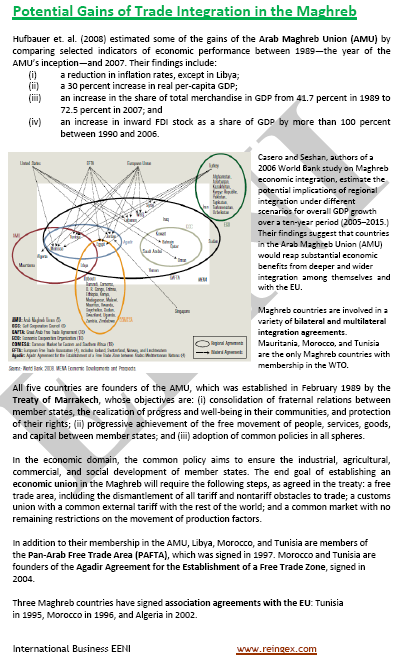
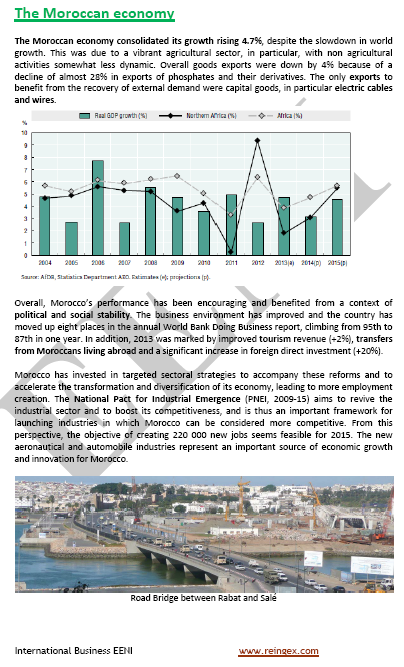
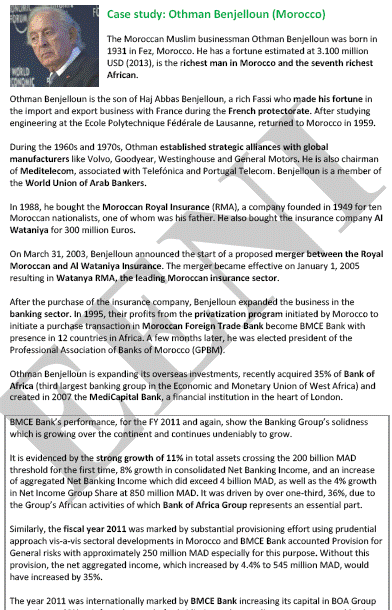
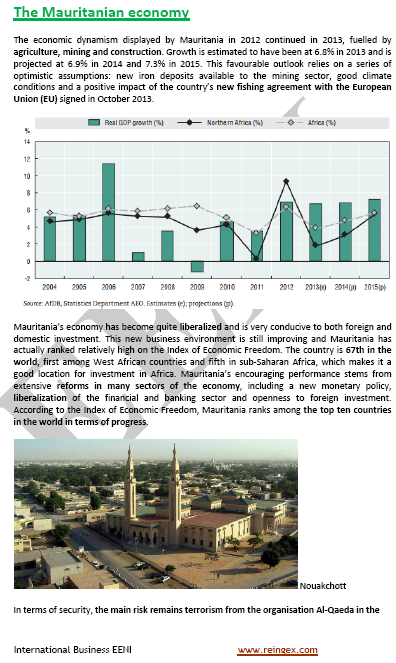
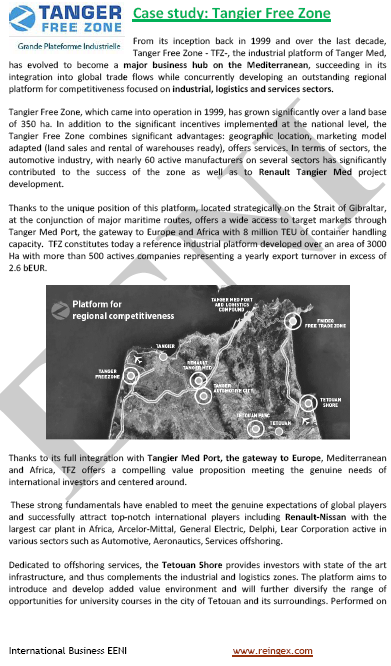
Language of the subject (optional) “Doing Business in the Maghreb” of the Bachelor of Science in Inter-African Business taught by EENI Global Business School (Sixth semester):  or
or  EENI
EENI  EENI
EENI  EENI.
EENI.
(c) EENI Global Business School (1995-2024)
We do not use cookies
Top of this page

